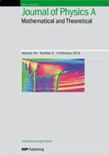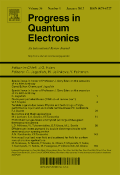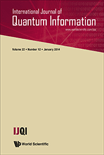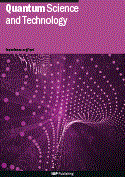
EPJ Quantum Technology
Scope & Guideline
Fostering Collaboration in the Quantum Realm
Introduction
Aims and Scopes
- Quantum Communication and Cryptography:
Research in this area includes protocols for quantum key distribution, authentication methods, and secure communications leveraging quantum properties to enhance security and privacy. - Quantum Computing and Algorithms:
This scope covers advancements in quantum algorithms, quantum architectures, and methods for improving computational efficiency, including quantum annealing and quantum simulations. - Quantum Education and Outreach:
The journal aims to broaden access to quantum technologies through educational initiatives, including courses and MOOCs designed to engage a wider audience in quantum science. - Quantum Sensors and Measurement:
Research related to the development of quantum sensors, including their applications in telecommunications and environmental monitoring, as well as techniques to enhance measurement precision. - Quantum Materials and Devices:
This focus encompasses the study of materials and devices that enable quantum phenomena, such as superconductors and trapped ions, which are critical for the implementation of quantum technologies. - Interdisciplinary Quantum Applications:
The journal also explores applications of quantum technologies across various fields, including finance, healthcare, and information technology, promoting a multidisciplinary approach.
Trending and Emerging
- Integration of Quantum Machine Learning:
There is an increasing trend towards exploring the intersection of quantum computing and machine learning, particularly in developing algorithms that leverage quantum properties for enhanced learning capabilities. - Quantum Networking and Entanglement:
Research on quantum networks, including entanglement distribution and multi-party protocols, is gaining momentum as the demand for secure communication systems grows. - Quantum Error Correction and Fault Tolerance:
As quantum systems scale, there is a significant focus on developing robust error correction techniques and fault-tolerant quantum computation methods to ensure reliable operation. - Quantum Technology in Industry and Commercialization:
The journal is seeing a rise in papers discussing the practical applications of quantum technologies in industry, including financial services and telecommunications, reflecting a shift towards commercialization. - Cross-Disciplinary Quantum Applications:
Emerging themes include the application of quantum technologies in diverse fields such as healthcare, environmental science, and military applications, showcasing the versatility of quantum innovations.
Declining or Waning
- Classical Quantum Computing Comparisons:
There has been a noticeable decrease in papers that primarily compare quantum computing to classical computing without proposing novel quantum advancements, suggesting a shift towards more practical quantum applications. - Low-Impact Quantum Applications:
Research focused on niche or low-impact applications of quantum technology has waned, as the field moves towards more impactful and scalable solutions. - Basic Quantum Mechanics Education:
Publications that focus solely on fundamental quantum mechanics education without direct applications to quantum technologies have become less frequent, as the emphasis shifts towards applied quantum education. - Theoretical Quantum Models with Limited Practicality:
There is a reduced focus on purely theoretical models that do not have clear pathways to practical implementation or experimental validation, indicating a trend towards more applied and experimental research.
Similar Journals

Journal of Physics A-Mathematical and Theoretical
Charting New Territories in Physics and AstronomyThe Journal of Physics A-Mathematical and Theoretical, published by IOP Publishing Ltd, is a premier peer-reviewed journal dedicated to advancing the understanding of mathematical physics, modeling, and simulation methods within the dynamic field of physics and astronomy. Established in the United Kingdom, this journal has made significant contributions over the years, maintaining a strong reputation as a Q1 and Q2 ranked journal across various categories, reflecting its influence in the scientific community. With a focus on innovative and theoretical approaches, it provides a platform for researchers, professionals, and students to disseminate their findings and engage with groundbreaking methodologies. Despite its lack of open access options, the journal's high impact factor and Scopus rankings, which place it in the top percentiles across multiple disciplines, underscore its critical role in fostering scholarly communication and collaboration in mathematical and theoretical physics. As we move through its converged years from 2007 to 2024, the Journal of Physics A continues to be a pivotal contributor to the landscape of contemporary physics, stimulating discussions and advancing knowledge in an ever-evolving realm.

PROGRESS IN QUANTUM ELECTRONICS
Illuminating the Future of Electrical EngineeringPROGRESS IN QUANTUM ELECTRONICS, published by PERGAMON-ELSEVIER SCIENCE LTD, is a premier international journal that serves as a critical forum for the dissemination of high-quality research in the fields of atomic and molecular physics, electrical engineering, and materials science. With its esteemed Q1 category ranking in several disciplines, including Atomic and Molecular Physics, Electrical and Electronic Engineering, and Electronic, Optical and Magnetic Materials, this journal commands a high impact factor and is recognized for its rigorous peer-review process. Established in 1969 and evolving through various phases, the journal currently compiles cutting-edge research that drives advancements in quantum technologies. Researchers, professionals, and students alike are invited to explore a wealth of knowledge and stay updated on pioneering developments in quantum electronics, enhancing their understanding and contributing to the progression of this dynamic field.

INTERNATIONAL JOURNAL OF QUANTUM INFORMATION
Illuminating the Path of Quantum DiscoveryINTERNATIONAL JOURNAL OF QUANTUM INFORMATION is a prominent academic journal published by World Scientific Publishing Co. Pte Ltd that serves as a critical platform for disseminating research in the rapidly evolving field of quantum information science. This journal, which has an ISSN of 0219-7499 and E-ISSN 1793-6918, covers significant advancements from 2005 to 2024, providing insights into quantum computation, quantum cryptography, and related topics that are essential for both theoretical and experimental physicists. The journal's influence is recognized in the academic community, as evidenced by its classification in the Q3 category within Physics and Astronomy (miscellaneous) as of 2023, where it ranks at #45 out of 81 with a percentile of 45. Although currently not available as an open access journal, it remains a pivotal resource for researchers and scholars aiming to stay at the forefront of quantum information research. As the field continues to grow in importance and application, the INTERNATIONAL JOURNAL OF QUANTUM INFORMATION plays a vital role in fostering innovative discoveries and promoting academic collaboration.

Frontiers of Physics
Elevating Physics Knowledge to New HeightsFrontiers of Physics, published by Higher Education Press, is a premier open-access journal dedicated to fostering innovative research and excellence within the field of physics. With an ISSN of 2095-0462 and an E-ISSN of 2095-0470, this rapidly growing journal has established itself as a valuable platform for disseminating cutting-edge findings, covering a diverse range of topics from theoretical frameworks to experimental advancements. Notably, Frontiers of Physics has achieved an impressive Q1 ranking in the 2023 Scopus Quartiles for Physics and Astronomy, securing a competitive 5th out of 81 positions in its category, reflecting a high impact factor that underscores its importance to the scientific community. Since its inception in 2011 and continuing through 2024, the journal aims to bridge the gap between academia and industry, encouraging collaboration among researchers, professionals, and students alike. Its commitment to open access ensures that high-quality research is readily accessible, thereby promoting knowledge sharing and advancement in the global physics community. Explore the potential of your research in Frontiers of Physics, where the future of physics flourishes.

Quantum Science and Technology
Transforming Ideas into Quantum BreakthroughsQuantum Science and Technology is an esteemed academic journal published by IOP Publishing Ltd, specializing in the cutting-edge fields of quantum physics and technology. With a strong emphasis on innovation, the journal serves as a vital platform for researchers, professionals, and students engaged in Atomic and Molecular Physics, Electrical Engineering, and Materials Science. Since its inception in 2016, the journal has rapidly ascended to prominence, achieving Q1 rankings across multiple categories in 2023, reflecting its high impact and influence in the global scientific community. The journal is recognized for its rigorous peer-review process and commitment to disseminating groundbreaking research that pushes the frontiers of quantum science. Although it is currently not open access, the journal remains a pivotal resource for those seeking to stay at the forefront of developments in quantum technology and its applications. As part of its objectives, Quantum Science and Technology aims to connect diverse scholarly perspectives, fostering collaboration and knowledge exchange that can drive forward the quantum field.

JOURNAL OF EXPERIMENTAL AND THEORETICAL PHYSICS
Illuminating the Path from Theory to ExperimentJournal of Experimental and Theoretical Physics is a distinguished publication in the field of physics, dedicated to disseminating pioneering research and fostering intellectual discourse in both experimental and theoretical domains. Published by Pleiades Publishing Inc, this journal has established itself as a crucial platform for physicists, with a commendable Q3 categorization in the 2023 rankings within Physics and Astronomy, illustrating its impactful contributions to the discipline. The journal features a wide array of articles that delve into the intricacies of physical theory, experimental techniques, and applications, making it an invaluable resource for researchers, professionals, and students alike. Although it operates under a traditional access model, its longstanding history, dating back to 1980 and converging years through to 2023, underscores its commitment to advancing the frontiers of physics knowledge. The journal is also notable for its engagement in the scientific community, aiming to bridge the gap between theoretical predictions and experimental validations. As a part of Pleiades Publishing, it continues to uphold rigorous standards of academic excellence, inviting contributions that push the boundaries of current understanding and stimulate further exploration in the fascinating world of physics.

OPTICAL AND QUANTUM ELECTRONICS
Exploring the Nexus of Physics and EngineeringOPTICAL AND QUANTUM ELECTRONICS, published by SPRINGER, is a premier journal dedicated to advancing the fields of atomic and molecular physics, optics, and electronic engineering. With an ISSN of 0306-8919 and an E-ISSN of 1572-817X, this journal has established itself as a vital resource for researchers, professionals, and students alike, contributing to the discourse from its inception in 1969 to its continued publications through 2024. It holds impressive rankings in Scopus, placing within the top percentiles for its categories, specifically in the 64th for Electrical and Electronic Engineering and 63rd for Atomic and Molecular Physics. Though it does not currently offer open access options, the journal's robust impact factor reflects its importance within its field, making it an essential reference point for cutting-edge research and developments in materials science and optics. Through its rigorous peer-review process, OPTICAL AND QUANTUM ELECTRONICS remains committed to publishing high-quality, influential studies that push the boundaries of innovation and understanding in these dynamic areas of science.

Quantum Information Processing
Unlocking the secrets of quantum information.Quantum Information Processing, published by Springer, stands as a pivotal journal within the rapidly evolving field of quantum computing and information science. With an ISSN of 1570-0755 and an E-ISSN of 1573-1332, this journal has been a vital resource since its inception in 2004 and is set to continue contributing until 2024. Ranked in Q2 for Electrical and Electronic Engineering, Electronic, Optical and Magnetic Materials, and various other categories, its high visibility in academic circles is reinforced by its Scopus rankings, showcasing its integral role in advancing theoretical and practical aspects of quantum technologies. Although it operates under a subscription model, Quantum Information Processing prioritizes accessibility to groundbreaking research that covers a wide spectrum of topics, including quantum algorithms, quantum cryptography, and quantum error correction, making it essential reading for researchers, professionals, and students alike. As the field grows, the journal remains committed to fostering innovation and collaboration among scholars, ensuring its position as an influential platform for sharing pivotal advancements in quantum information theory and applications.

QUANTUM INFORMATION & COMPUTATION
Unlocking the Mysteries of Quantum InformationQUANTUM INFORMATION & COMPUTATION is a leading academic journal dedicated to the rapidly evolving fields of quantum information theory and quantum computing. Published by RINTON PRESS, INC, this journal serves as a pivotal platform for disseminating groundbreaking research, advancements, and theoretical insights in various domains including computational theory, mathematical physics, and high-energy physics. With its ISSN 1533-7146, the journal has established a solid reputation since its inception in 2001 and continues to engage researchers up to 2024. Despite its current standing in Q4 and Q3 quartiles across various categories, QUANTUM INFORMATION & COMPUTATION provides valuable contributions by fostering discussions on interdisciplinary applications and theories that challenge conventional paradigms. While the journal does not offer open access, it still supports a wide range of research topics, providing a vital resource for academics, professionals, and students keen on exploring the complex interplay between quantum mechanics and computation. By focusing on innovative techniques and theoretical developments, this journal is essential for anyone aiming to be at the forefront of the quantum revolution.

Quantum
Advancing the frontiers of quantum science.Quantum, an esteemed Open Access journal published by the Verein Förderung Open Access Publizierens Quantenwissenschaft, serves as a pivotal platform for the dissemination of groundbreaking research in the fields of atomic and molecular physics, and optics. Since its inception in 2017, Quantum has emerged as a leader in the academic community, boasting an impressive impact factor within the top quartile (Q1) in its categories, ranking #6 out of 81 in Physics and Astronomy (miscellaneous) and #35 out of 224 in Atomic and Molecular Physics, and Optics in 2023. With its global reach, based in Vienna, Austria, Quantum is dedicated to promoting innovative research and fostering collaboration among scientists, researchers, and students alike. The journal encourages unrestricted access to high-quality publications, ensuring that vital advancements in quantum science are available to all, thereby facilitating knowledge exchange and accelerating scientific progress. Explore the cutting-edge developments at the forefront of quantum studies and contribute to a vibrant scholarly community.